A pure culture - Study guides, Class notes & Summaries
Looking for the best study guides, study notes and summaries about A pure culture? On this page you'll find 1761 study documents about A pure culture.
Page 4 out of 1.761 results
Sort by
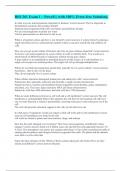
-
BIO 261 Exam 1 – Powell || with 100% Error-free Solutions.
- Exam (elaborations) • 15 pages • 2024
-
- $11.99
- + learn more
In what ways are microorganisms important to humans? correct answers They're important in fermentation reactions, they produce biofuel Studying microorganisms help with vaccination and antibiotic therapy We use microorganisms to purify our water Used in pasteurization so that food is safe to eat What is a bacterial colony and how is one formed? correct answers A colony forms by placing a single microbial cell on a solid nutrient medium where it can grow and divide into millions of cells. ...
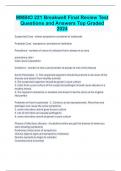
-
MMBIO 221 Breakwell Final Review Test Questions and Answers Top Graded 2024
- Exam (elaborations) • 21 pages • 2024
-
Available in package deal
-
- $12.99
- + learn more
Suspected Case - shows symptoms consistent w/ outbreaks Probable Case - symptoms consistent w/ definition Prevalence - number of cases of a disease that is always in an area prevelance rate= total cases/ population Incidence - number of new cases/number of people at risk of the disease Kochs Postulates - 1. The suspected organism should be present in all cases of the disease and absent from healthy animals 2. The suspected organism should be grown in pure culture 3. Cells from ...
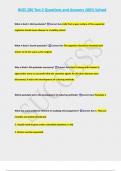
-
BIOS 280 Test 2 Questions and Answers 100% Solved
- Exam (elaborations) • 51 pages • 2024
- Available in package deal
-
- $15.99
- + learn more
BIOS 280 Test 2 Questions and Answers 100% Solved What is Koch's third postulate? Correct Ans-Cells from a pure culture of the suspected organism should cause disease in a healthy animal
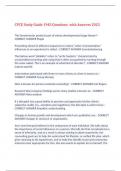
-
CPCE Study Guide 1945 Questions with Answers 2023,100% CORRECT
- Exam (elaborations) • 223 pages • 2023
-
Available in package deal
-
- $17.99
- 1x sold
- + learn more
CPCE Study Guide 1945 Questions with Answers 2023 The Sensorimotor period is part of whose developmental stage theory? - CORRECT ANSWER Piaget Presenting stimuli in different sequences to reduce "order of presentation" influences in an experiment is called: - CORRECT ANSWER Counterbalancing The Eskimo word "piblokto" refers to "arctic hysteria," characterized by uncontrolled screaming and crying that is often accopanied by running through the snow naked. This is an example of wh...

-
Test Bank For Abnormal Psychology 16th Edition By Butcher - Hooley Mineka
- Exam (elaborations) • 632 pages • 2023
-
Available in package deal
-
- $32.87
- 1x sold
- + learn more
Chapter 1: Abnormal Psychology: An Overview Multiple-Choice Questions 1.1-1. Which of the following is an example of family aggregation? a. Both Jane and her husband are alcoholic. b. Jim and John, 21-year-old friends, are both schizophrenic. c. Karen, her mother, and her grandmother all have been diagnosed with generalized anxiety disorder. d. Kim's suicide was apparently a reaction to her mother's abuse. Difficulty: 1 Question ID: 1.1-1 Page Ref: 2 Topic: Abnormal Psychology:An Overv...
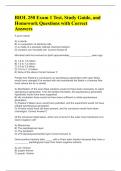
-
BIOL 250 Exam 1 Test, Study Guide, and Homework Questions with Correct Answers
- Exam (elaborations) • 23 pages • 2024
- Available in package deal
-
- $13.49
- + learn more
A pure culture A) is sterile. B) is a population of identical cells. C) is made of a precisely defined chemical medium. D) contains one microbial cell. Correct Answer B Microbial cells first evolved on Earth approximately ________ _______ years ago. A) 1.6 to 1.8 million B) 7.0 to 7.2 million C) 3.8 to 3.9 billion D) 10.5 to 11.5 billion E) None of the above Correct Answer C Predict how Pasteur's conclusions on spontaneous generation with swan flasks would have changed if he...
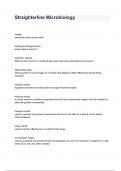
-
Straighterline Microbiology Exam Questions And Answers
- Exam (elaborations) • 35 pages • 2024
- Available in package deal
-
- $14.99
- + learn more
Straighterline Microbiology Exam Questions And Answers motility semisolid media shows what? isolating/culturing bacteria solid media is best for? synthetic; defined What are the terms for a media whose exact chemical compositions are known? differential media allows growth of several types of microbes and displays visible differences among those microbes selective media suppress unwanted microbes and encourage desired microbes reducing media a culture medium ...
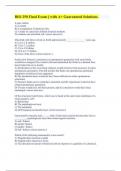
-
BIO 250 Final Exam || with A+ Guaranteed Solutions.
- Exam (elaborations) • 13 pages • 2024
- Available in package deal
-
- $10.99
- + learn more
A pure culture A) is sterile. B) is a population of identical cells. C) is made of a precisely defined chemical medium. D) contains one microbial cell. correct answers b Microbial cells first evolved on Earth approximately ________ _______ years ago. A) 1.6 to 1.8 million B) 7.0 to 7.2 million C) 3.8 to 3.9 billion D) 10.5 to 11.5 billion E) None of the above correct answers c Predict how Pasteur's conclusions on spontaneous generation with swan flasks would have changed if he w...
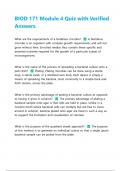
-
BIOD 171 Module 4 Quiz with Verified Answers |Latest 2024/2025
- Exam (elaborations) • 20 pages • 2024
- Available in package deal
-
- $10.99
- + learn more
What are the requirements of a fastidious microbe? A fastidious microbe is an organism with complex growth requirements and will not grow without then. Enriched medias thus contain these specific and essential nutrients required for the growth of a particular subset of microorganisms. What is the name of the process of spreading a bacterial culture onto a petri dish? Plating. Plating microbes can be done using a sterile loop, a sterile swab, or a sterilized wire loop. Each device is simpl...
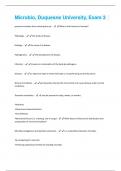
-
Microbio, Duquesne University, Exam 3 (Graded A+ actual test)
- Exam (elaborations) • 31 pages • 2024
- Available in package deal
-
- $7.99
- + learn more
prevents microbes from entering the ear. - What is the function of earwax? Pathology: - the study of disease. Etiology: - the cause of a disease. Pathogenesis: - the development of disease. Infection: - invasion or colonization of the body by pathogens. Disease: - an abnormal state in which the body is not performing normal functions. Normal microbiota: - permanently colonize the host and do not cause disease under normal conditions. Transient microbiota: - may be present for days, weeks...

Study stress? For sellers on Stuvia, these are actually golden times. KA-CHING! Earn from your study resources too and start uploading now. Discover all about earning on Stuvia


